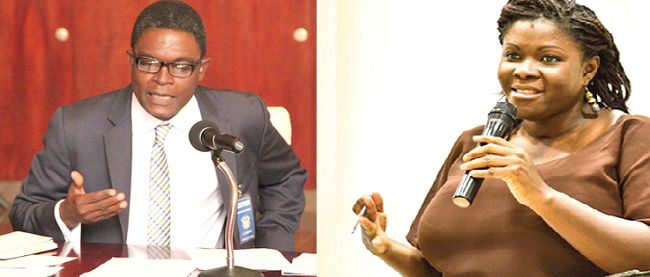
Parliament losing its shine — IDEG boss
The Executive Director of the Institute of Democratic Governance (IDEG), Dr Emmanuel Akwetey, has observed that there has been a steady decline in the quality of people going into Ghana’s Parliament.
Advertisement
After staring operations in 1993 with top notch professionals, Dr Akwetey said competence and quality of people elected as Members of Parliament had continued to decline, much to the detriment of the country and the Legislature in particular.
He explained that the decline was captured in a study conducted by the IDEG, a non-governmental organisation working to help improve good governance.
He made the observation on the weekly motivational talk show, the Springboard, on Joy FM, when he and Mrs Kathleen Addy, a communications consultant appeared on the show.
It was part of the show’s ‘My Ideal Ghana Series,’ which is aimed at motivating people to work towards building the nation they want to see in Ghana.
Their discussions, which was the 12th on the series was themed “10 critical success factors of national development.”
How to solve it
Expatiating on the decline in the quality of human resource in Parliament, Dr Akwetey said the trend was inimical to the development needs of the country, given the importance the legislature plays in the socio-economic development of nations.
To help address the problem, he said there was the need for the country to open up the local governance structure for political parties to participate.
That, he said, would be the enabler that would then produce the quality of human resource needed to occupy Parliament.
Once that was done, Dr Akwetey said Parliament could be expected to operate smoothly and effectively as it was doing, when it first started.
He also observed as worrying the tendency of MPs to double as development agents, explaining that such an anomaly could be rectified if district chief executives were elected.
“When your chief executive is elected and the assembly members are also elected and they have the funds to do what they need to do, Members of Parliament will not need to justify their relevance in the governance system and that will help revamp Parliament as an institution,” he said.
On what his ideal Ghana would be like, he said: “My ideal Ghana is a caring, inclusive, peaceful, prosperous, self-reliance and a happy democratic nation.”
He said in order to achieve such development it was very important for the country to move towards an inclusive system of governance rather than the exclusionary one, which had never favoured the citizenry.
Parties as election machines
He opined that it would have been better for the country to develop a system that created a propositional representation at the local assembly level rather than the current system, which favoured Parliament.
That, he said, was because the executive power of the president was not anchored in Parliament, saying “our system of governance is not the parliamentary system where the prime minister is elected from Parliament.”
He noted that it would have been very beneficial to the state if the country supported political parties to become developmental political parties, explaining that “the ones we have currently are electoral machines”.
“I think we should work hard to have developmental political parties because our parties now are developmental machines. Although they really aspire to play much bigger roles in the development of the state, their financiers are mostly interested in elections,” he indicated.
He also sided with suggestions that the state must fund political parties to ensure that they were well resourced to be able to participate in activities that would ensure effective progress of society.
Reforming civil service
He opined that it would have been better for the country to establish a modern professional civil service whose qualities would be based on merit and impartiality.
“Although Article 35 (8) of the 1992 Constitution states that the state shall take steps to eradicate corrupt practices and abuse of power, we are divided as to whether corruption is bad or wrong,” he noted.
The IDEG’s Executive Director indicated that for the country to attain higher status in the world it was important for Ghana to change its developmental model and find a way of curbing corruption.
“Our system is such that the political class is the most unsecured group after they leave office,” Dr Akwetey observed.
Again, he said it was also very crucial for Ghana to have a more radical second chance postgraduate educational system to help boost the country’s human resource.
Just society
Madam Addy also underscored the need for a just society, where there were equal opportunities for all. It should also provide a social mobility based on meritocracy that supports its citizenry to thrive.
She said, “it was also important for the country to identify people who will be able to redefine a modern Ghanaian society with confidence and be able to define a vision for the future.”
She said that patriotism was not something that was spontaneous but something that one could deliberately grow and nurture.
“So, if we are going to see that new Ghanaian, it is not going to happen automatically; someone must create a vision and develop steps to ensure it comes to effect,” she added.
Begging mentality
Madam Addy indicated that it would have been great for Ghana to be a self-sufficient country that could support other countries rather than accepting alms from others every time.
“I believe if we let go of our begging mentality and we strive hard to be self-sufficient, it will go a long way to put the ideal Ghana in place,” she underlined.



